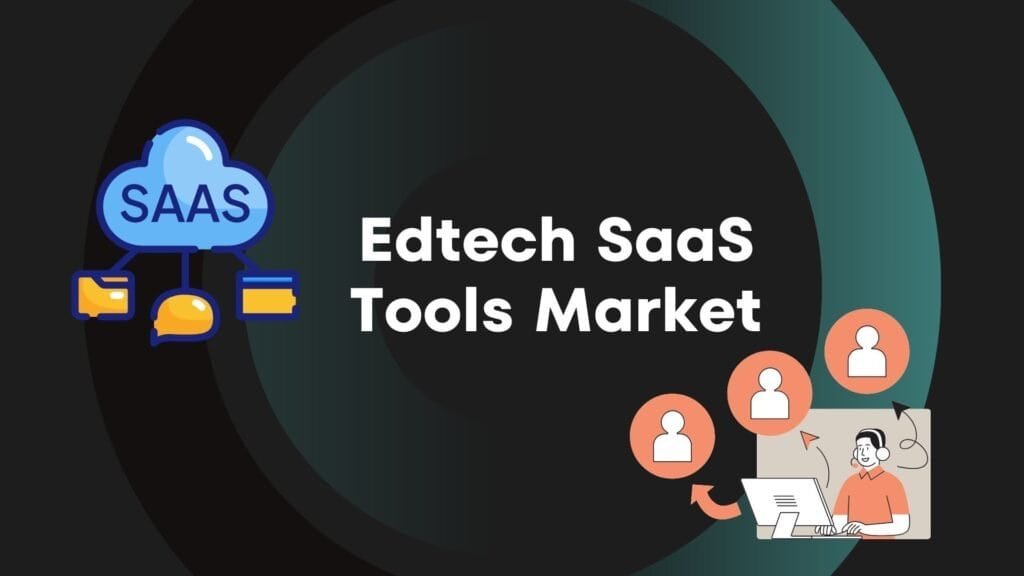Introduction
The Edtech SaaS Tools Market is a fast-evolving segment that delivers cloud-based solutions to schools, universities, and businesses, supporting both teaching and training needs. These tools include learning management systems, virtual classrooms, assessment and communication platforms, along with analytics and workflow automation for administrators. By enabling instant access to content, flexible course delivery, and easy progress tracking, SaaS tools are changing how education and corporate training happens across the world.
According to Market.us, The Global Edtech SaaS Tools Market is witnessing rapid growth as digital learning adoption accelerates worldwide. The market is projected to reach nearly USD 141 billion by 2033, up from USD 38 billion in 2023, expanding at a CAGR of 14.1% during 2024 to 2033. This expansion is being driven by the increasing demand for flexible, accessible, and personalized learning solutions across schools, universities, and enterprises.

Top driving factors include the normalization of hybrid learning, large scale skills initiatives in AI, and institutional needs for interoperability. Public school and higher education systems now face binding accessibility requirements for websites and mobile apps, which is accelerating platform modernization. In the United States, the Department of Justice finalized a Title II rule in April 2024 that points institutions to WCAG 2.1 Level AA for compliance, creating clear technology baselines for procurement and deployment. At the same time, global programs to close AI skills gaps are catalyzing demand for scalable digital learning tools.
Key Takeaways
- The Learning Management System (LMS) segment accounted for 54.1% share, making it the largest segment. LMS solutions are widely implemented in schools, universities, and enterprises to organize digital courses, track performance, and support remote learning.
- The K-12 education segment held over 37.9% share, reflecting the increasing integration of digital tools in schools to improve teaching effectiveness, enhance student engagement, and support hybrid learning models.
- The business application segment emerged as a strong growth driver, as companies prioritized employee training, upskilling, and compliance programs using SaaS-based EdTech platforms.
According to the findings of Market.us, the EdTech Market is advancing on a strong growth path, projected to rise from USD 220.5 billion in 2023 to USD 810.3 billion by 2033, reflecting a CAGR of 13.9% during 2024 to 2033. North America continues to hold a pivotal position, accounting for over 37.3% of the global share with revenue of USD 82.24 billion in 2023. This regional strength is supported by rapid digital adoption across K-12, higher education, and corporate training, making it a cornerstone of EdTech expansion.
Corporate EdTech has become one of the most influential segments within this landscape. According to Exploding Topics, the sector is valued at USD 27.5 billion, as companies increasingly prioritize digital learning platforms for workforce development. Digital training has now become the leading method for skill-building, signaling a major shift toward flexible and technology-driven learning solutions that meet the evolving needs of modern enterprises.
The education sector also reflects a clear transformation at both K-12 and higher education levels. Usage of EdTech in K-12 schools has surged by 99%, demonstrating the reliance on digital platforms to enhance classroom experiences. At the same time, higher education is embracing online learning, with more than 70% of colleges expected to introduce one or more online undergraduate programs in the next three years. These trends highlight how technology integration across different education stages is fueling sustained demand for EdTech solutions globally.
Regional Analysis
In 2023, North America emerged as the leading region, accounting for over 36% of the global share with revenue of USD 36.68 billion. The region’s dominance is supported by advanced digital infrastructure, strong investment in EdTech innovation, and early adoption of SaaS-based learning platforms. North America continues to lead in integrating AI-driven tools, cloud-based solutions, and personalized learning platforms, reinforcing its position as the key growth driver of the global market.

Key Trends & Innovations
| Trend/Innovation | Description |
|---|---|
| AI-Powered Adaptive Platforms | Machine learning tailors content, pacing, and modality in real time |
| Gamification & Immersive Learning | AR/VR and game-based elements boost engagement and knowledge retention |
| Microlearning Modules | Bite-size, mobile-friendly lessons for higher retention and flexible learning |
| Blockchain Credentialing | Tamper-proof, verifiable digital records for exams, certificates, and transcripts |
| Data Analytics & Predictive Insights | Instructors and admins use dashboards for timely intervention and performance feedback |
| API-centric & Modular Architecture | Seamless integration across LMS, SIS, and third-party learning applications |
| Custom Content Authoring | Toolkits for educators, trainers, and students to build or remix interactive content |
Driver Analysis
Shift to Remote and Hybrid Learning
A central force driving the adoption of Edtech SaaS tools is the growing demand for remote and hybrid learning options. The shift began with the response to global disruptions and continues as both educators and learners seek flexible, location-independent solutions. SaaS platforms support the creation of virtual classrooms, real-time feedback, and smart content management, making them essential to the digital classroom experience.
Governments and educational institutions are actively supporting the digital transformation through policy and funding, recognizing the benefits of scalable, low-maintenance solutions. The needs of adult learners, corporate training, and upskilling programs are also helping push adoption rates higher, as companies seek to maintain and grow their workforce skills efficiently.
Restraint Analysis
Data Privacy and Security Concerns
Though SaaS tools bring many benefits, data privacy remains one of the main concerns. Educational platforms collect sensitive information about students, teachers, and institutions, raising questions about how data is stored, transferred, and used. Compliance with regulations and ensuring robust protection against breaches is a major focus for decision-makers.
Additionally, technical difficulties – such as integrating new SaaS products with older systems or ensuring reliable connectivity in rural or underdeveloped areas – pose challenges. Smaller institutions may find costs related to tech infrastructure, user training, and ongoing maintenance difficult to manage, which can delay or complicate full-scale adoption.
Opportunity Analysis
Corporate Training and Global Expansion
There is a significant growth opportunity for Edtech SaaS providers in supporting corporate training, lifelong learning, and professional development. As businesses increasingly invest in employee upskilling and compliance training, they need customizable, scalable, and measurable solutions. SaaS platforms that deliver modular content, track individual learning progress, and offer reports to HR departments can capture this expanding demand.
Furthermore, emerging markets – especially in Asia-Pacific and Latin America – are witnessing rapid uptake of digital education fueled by better internet access and mobile device adoption. Providers who make their platforms accessible, multi-lingual, and relevant for local cultures can gain an edge in these regions.
Challenge Analysis
Integration with Legacy Systems and Skills Shortage
One of the pressing challenges is integrating SaaS products seamlessly with legacy IT and educational systems already in place at many institutions. Custom integrations often inflate project costs and complicate maintenance, slowing overall project timelines. At the same time, schools and businesses may struggle to find staff or partners with the right technical skills for administering and updating these platforms.
Another related challenge is change management. Educators may hesitate to leave familiar teaching methods or face a steep learning curve with new technology. Successful adoption often depends on robust training, ongoing support, and thoughtful leadership to help stakeholders adapt to these new tools and realize their benefits in daily teaching and learning.
Key Market Segments
-
Software
- Classroom Management System
- Document Management System
- Learning and Gamification
- Learning Management System
- Student Collaboration System
- Student Information and Administration System
- Student Response System
- Talent Management System
- Test Preparation
By Sector
- Preschool
- K-12
- Higher Education
- Others
End Use Outlook
- Business
- Consumer
Top Companies in EdTech SaaS
- Top Hat
- Anthology Inc.
- Brightwheel
- Coursera Inc.
- eduZilla
- Google LLC
- Instructure, Inc.
- Kahoot!
- Microsoft
- McGraw Hill
- PowerSchool
- D2L
- Kajabi












